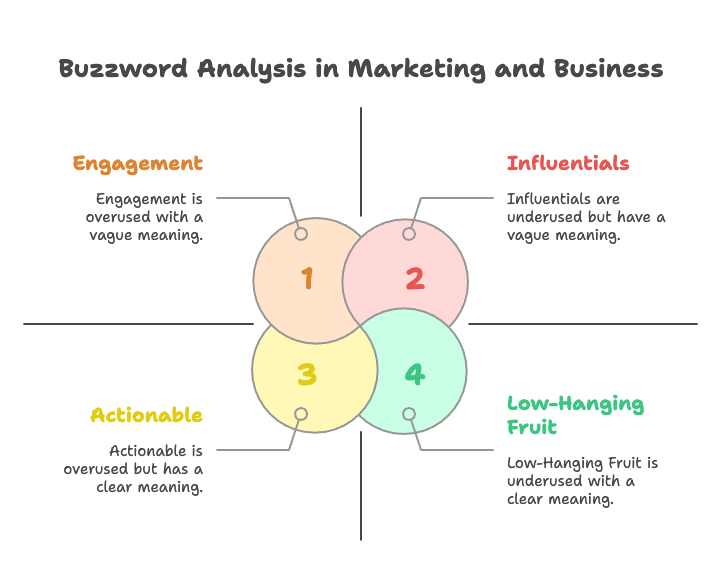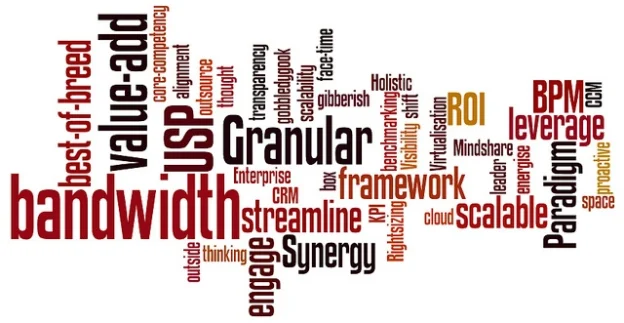If you’ve worked in marketing, you’ve likely seen a lot of jargon. Many industries are the same. This shouldn’t surprise you.
Often, jargon is the best way to simplify complex topics. It makes them easier to explain. For that reason, I’m not entirely against its use, nor do I deny its efficacy given the right circumstances.
The problem with jargon is that when overused – or repeatedly misused – its meaning tends to grow distorted over time. It becomes a buzzword; an empty, meaningless propaganda phrase which is more a sign of laziness than knowledge. While jargon is best used sparingly, buzzwords should be avoided at all costs.
I’ve compiled a list of some of the more common buzzwords floating around the world of digital marketing. I’d advise against using any of them if you can help it. Your readers will thank you for it.
Actionable
Originally, Actionable was a legal adjective used to refer to a particular course which was grounds for a lawsuit. Somewhere along the way, someone decided to warp the word so its definition fit into the world of marketing and business. In this context, it simply means “something which can be acted upon.”
Naturally, many writers and marketers alike latched onto this phrase like leeches. At least once a week, I see an article with a title like “X actionable tips for Y.” What used to be high-energy jargon is now a passive, boring buzzword; it’s like a professional athlete who let go and gradually transformed into a rolling mass of fat.
Use Instead: Useful, practicable, practical, functional.

Thought Leader
Naturally, you want folks to think you’re good at what you do (or that you know people who are). One particularly low-effort shortcut to convey this message is by resorting to the phrase “thought leader.” While the meaning is a lot clearer than some of the buzzwords on this list,
Using such a phrase to refer to your brand (or yourself) is arrogant at best; using it to refer to someone else just smacks of lazy writing.
Use Instead: Nothing. Instead of simply calling someone a leader, why not explain why they’re a leader?
Influentials
Suggested by Greg Satell of Forbes, the term “Influentials” is a catch-all word used to refer to anyone who happens to have a great deal of influence over the purchasing decisions of others; the definition of the term argues that there are certain traits which identify such trend-setters. For that reason, this buzzword is troubling beyond how overused it tends to be.
The core idea that influencers can be identified by a particular set of traits, argues Satell, is flawed; as such, identifying influential individuals under a single umbrella is illogical. Yes, some authorities have much more influence.
Celebrities, industry leaders, and executives are examples. However, there’s no proof they share specific traits that make them influential. Also, there’s no sign that they are absolutely vital in making a campaign go viral.
Use Instead: Celebrities, authorities, managers, politicians, friends, family.
Engagement
Forbes suggested another term. I need to be honest: I’ve used this buzzword before. It’s the most overused one in online marketing. The problem is, no one really knows what it means.
The way I’ve used it, “engagement” means making your audience interested in what you do. It also means giving them something valuable. This makes them want to come back to your site.
Use Instead: Satell instead suggests using a term like value exchange. Other possible replacements for engagement could include
Low-Hanging Fruit
“Low-hanging fruit” refers to search terms with less traffic. These terms are not as popular as others. The idea is that fewer websites target these “smaller” keywords. Because of this, a website can rank higher more easily.
It’s simpler than trying to rank for popular terms. However, the term is misleading. It oversimplifies how to choose keywords. Also, it wrongly implies that unique keywords are somehow “worse” than popular ones.
That simply isn’t the case.
Use Instead: lesser-used, localized, specialized
In Closing
We often work with complicated terms. Therefore, we create jargon to make them simpler. This can’t be avoided. However, if you work in marketing or another area, be careful with jargon.
If you use it too much, or don’t fully understand it, the terms can become meaningless buzzwords. They end up just being noise.




